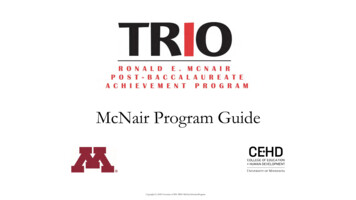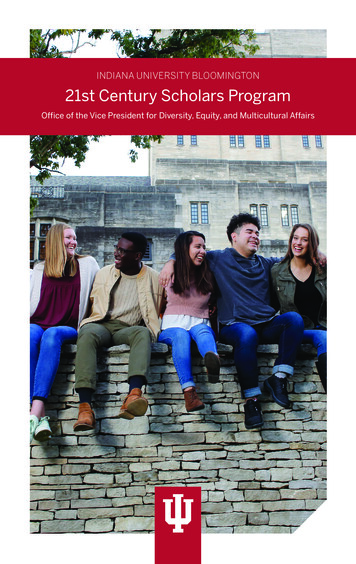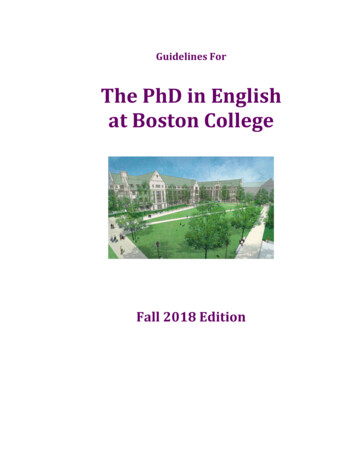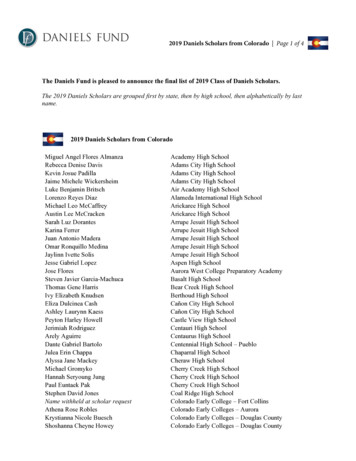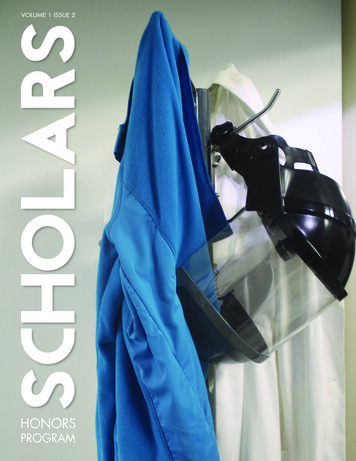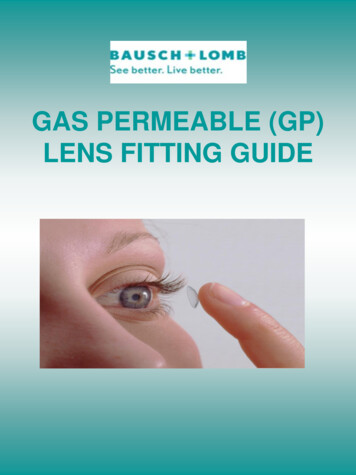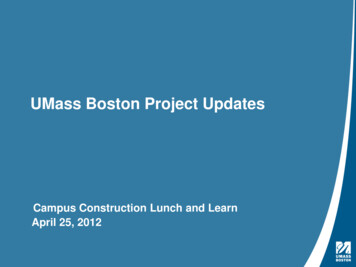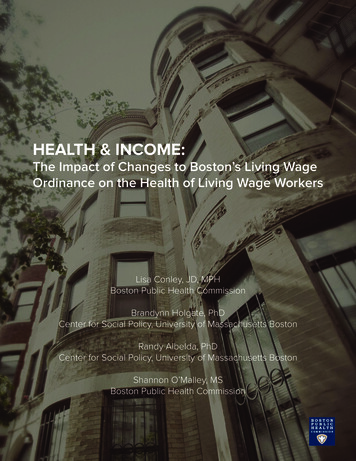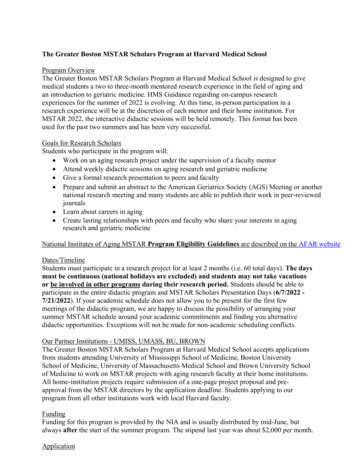
Transcription
The Greater Boston MSTAR Scholars Program at Harvard Medical SchoolProgram OverviewThe Greater Boston MSTAR Scholars Program at Harvard Medical School is designed to givemedical students a two to three-month mentored research experience in the field of aging andan introduction to geriatric medicine. HMS Guidance regarding on-campus researchexperiences for the summer of 2022 is evolving. At this time, in-person participation in aresearch experience will be at the discretion of each mentor and their home institution. ForMSTAR 2022, the interactive didactic sessions will be held remotely. This format has beenused for the past two summers and has been very successful.Goals for Research ScholarsStudents who participate in the program will: Work on an aging research project under the supervision of a faculty mentor Attend weekly didactic sessions on aging research and geriatric medicine Give a formal research presentation to peers and faculty Prepare and submit an abstract to the American Geriatrics Society (AGS) Meeting or anothernational research meeting and many students are able to publish their work in peer-reviewedjournals Learn about careers in aging Create lasting relationships with peers and faculty who share your interests in agingresearch and geriatric medicineNational Institutes of Aging MSTAR Program Eligibility Guidelines are described on the AFAR websiteDates/TimelineStudents must participate in a research project for at least 2 months (i.e. 60 total days). The daysmust be continuous (national holidays are excluded) and students may not take vacationsor be involved in other programs during their research period. Students should be able toparticipate in the entire didactic program and MSTAR Scholars Presentation Days (6/7/2022 7/21/2022). If your academic schedule does not allow you to be present for the first fewmeetings of the didactic program, we are happy to discuss the possibility of arranging yoursummer MSTAR schedule around your academic commitments and finding you alternativedidactic opportunities. Exceptions will not be made for non-academic scheduling conflicts.Our Partner Institutions - UMISS, UMASS, BU, BROWNThe Greater Boston MSTAR Scholars Program at Harvard Medical School accepts applicationsfrom students attending University of Mississippi School of Medicine, Boston UniversitySchool of Medicine, University of Massachusetts Medical School and Brown University Schoolof Medicine to work on MSTAR projects with aging research faculty at their home institutions.All home-institution projects require submission of a one-page project proposal and preapproval from the MSTAR directors by the application deadline. Students applying to ourprogram from all other institutions work with local Harvard faculty.FundingFunding for this program is provided by the NIA and is usually distributed by mid-June, butalways after the start of the summer program. The stipend last year was about 2,000 per month.Application
If you have any questions about the application process, please contact us atBostonMSTAR@bwh.harvard.edu.Application materials and instructions are available at the BWH Division of Aging website.Applications may be submitted between November 22, 2021 and January 14, 2022 5PM EST.To simplify our matching process this year, we will ask each applicant who wishes to work witha Harvard mentor to review the mentor list and rank their top 3 choices. Students should notcontact these mentors directly, and decisions about acceptance and pairing will be announcedbeginning February 7th, 2022.We are an equal opportunity program, and all qualified applicants will receive consideration forour program without regard to race, color, religion, sex, national origin, disability status,protected veteran status, gender identity, sexual orientation, pregnancy and pregnancy-relatedconditions or any other characteristic protected by law. Women and minority candidates areparticularly encouraged to apply.
Mentorship and Research ProjectsPlease review our list of recent faculty mentors, research projects, and project types below.Mentors vary from year-to-year based on their availability. The most successful mentorshippairings are often the result of students having strong research interests and identifying facultyin the Harvard research community doing work in that area. Due to the high volume ofapplications, we have received over the past few cycles and the need to do a completely remoteproject, we are streamlining our usual student-mentor pairing process as follows:1. For students applying to work with a Harvard Mentor:We have provided a list of mentors (see below) and their profiles on Harvard Catalyst.Please look at this list, rank the top 3 mentors that seem aligned with your interests andwrite this down on your application in the section which asks about your researchinterests. It is very helpful if you can tell us what aspect of the faculty member’s workappeals to you (e.g., the research question, the research area, the patient population, orthe research method). Given the large number of early program inquiries this year,please do not reach out to past MSTAR mentors directly.2. For students from one of our affiliated institutions:If you are applying to work with a mentor at your own institution, please write thename of the mentor and your research project on the application. Your applicationshould also be accompanied by a 1-page proposal of your research project. If youcannot find a local mentor, you are welcome to apply to work with a Harvardmentor.Please follow the active links in the table below to learn more about each recent mentor. AtHarvard Catalyst you can also perform a key word search to find other Harvard researcherswho share your interests.Research Mentors and Projects (Summer 2016 through Summer 2021):ProjectsProject TypeMentorInstitutionExploring Student, Resident and FacultyPerspectives on Serious IllnessCommunication Training inUndergraduate and Graduate MedicalEducationRefinement of ED GOAL for patientswith cognitive impairmentQualitative StudyDr. Justin SandersDana FarberCancer InstituteQualitative StudyDr. Kei OuchiBrigham andWomen’s HospitalA crosswalk among frailty measures inthe National Health and Aging TrendsStudyEpidemiologic StudyDr. Dae KimHebrew SeniorLife/ Brigham andWomen’s HospitalGoals of Care Documentation in ClinicalNotes of Older Adults with AdvancedCancerObservational StudyDr. Charlotta LindvallDana FarberCancer Institute
CRESCENT Implementation- Assessingthe Experience of Dementia CareManagersQualitative StudyDr. Christine RitchieMassachusettsGeneral HospitalHigh intake of dietary flavonoids andEpidemiologic Studyodds of frailty onset in middle-age andolder adults in the Framingham OffspringCohortPhenomapping to Distinguish UniqueEpidemiologic StudyPhenotypes of FrailtyDr. Shivani SahniHebrew SeniorLifeDr. Jordan StromBeth IsraelDeaconessMedical CenterProvider Perspectives on Safer OpioidPrescribing GuidelinesDr. VassilikiPravodelovBoston UniversityMedical CenterDr. Shivani SahniHebrew SeniorLifeDr. Dae KimBeth IsraelDeaconessMedical CenterCerebrovascularInstitute SpauldingRehabHebrew SeniorLifeQualitative StudyHigher abdominal adiposity is associated Epidemiologic Studywith decreased lean muscle mass andmuscle strength in men and women: TheFramingham StudyPreoperative Cognitive Function and Risk Epidemiologic Studyof Poor Outcome for Older AdultsUndergoing Aortic Valve ReplacementDevelopment of Neurovascular Couplingin AdolescentsPhysiology ResearchDr. Can Ozan TanDeveloping an Algorithm to ClassifyInjurious Falls Using ICD-10 ClaimsCodesValidation StudyDr. Sarah BerryGait Speed and Cognitive Impairment are Epidemiologic StudyPredictive of Outcomes in Elderly MalesWith Implantable Cardio-defibrillatorsDr. Ariela OrkabySocial Vulnerability, Frailty, andPreventable Hospitalizations of OlderAdultsThe Association between Serious IllnessConversations and Long-term Prognosisof Older Adults who Survive MechanicalVentilation in the ICUEpidemiologic StudyDr. Laura FrainVA BostonMedicalCenter/BWHBWHEpidemiologic StudyDr. Kei OuchiBWHSystematic ReviewDr. Ariela OrkabyVA BostonMedicalCenter/BWHScreening StudyDr. EdwardMarcantonioDr. Jane A. DriverHebrew SeniorLife /BIDMCVA BostonMedical CenterThe impact of frailty in theeffectiveness of cardioverterdefibrillators for the prevention ofsudden cardiac death (SCD) in olderpatientsComparative Efficiency of FourStrategies for Delirium ScreeningImplementation of SupportiveTransition of Care Program forVeterans with Serious IllnessClinical Research
Hypertension, NeurovascularCoupling, and Midlife CognitiveFunctionClinical ResearchDr. Can Ozan TanCerebrovascularInstitute SpauldingRehabFrailty Index for the Identification ofHigh-Risk Geriatric Patients with HipFractureClinical ResearchDr. Houman JavedanBWHThe Link between EarlyCerebrovascular Hemodynamics andFunctional Outcomes after AneurysmalSubarachnoidHemorrhageCerebrovascular Aging: Assessing theInfluence of Deferoxamine withProjection Pursuit RegressionFRAIL Questionnaire Screening Tooland Short-term Outcomes in GeriatricFracture PatientsPhysiology ResearchDr. Can Ozan TanCerebrovascularInstituteSpaulding RehabPhysiology ResearchDr. Can Ozan TanClinical ResearchDr. Houman JavedanCerebrovascularInstituteSpaulding RehabBWHThe Minimum Data Set Falls Short onCapturing FallsFeasibility of Quality Improvement forDepression Treatment in Medical HomeCare: Findings from the Making RealProgress in Emotional HealthProjectValidation StudyDr. Sarah BerryPilot Study/ClinicalResearchDr. Eran MetzgerHebrew SeniorLife/BIDMCHebrewSeniorLifeDASH Diet and Risk of AbdominalAortic Aneurysm in the Physicians'Health StudyThe clinical and economic benefits ofC-Trac: Nurse Driven TelephoneBased Transitional Care at VA BostonEpidemiologic StudyDr. Luc DjousseBWHClinical ResearchDr. Jane A. DriverAssessing Gait Speed in the Clinic another vital signClinical ResearchDr. Ariela OrkabyResponse to Lipopolysaccharide: Theimpact of aging on surgical outcomesClinical ResearchDr. Deborah CulleyVA BostonMedicalCenter/BWHVA BostonMedicalCenter/BWHBWHDiagnosing Delirium Superimposedon DementiaThe Impact of Social Vulnerability onReadmission of Hospitalized OlderPatientsComparison of Simple FrailtyAssessments in Predicting PoorOutcomes after Aortic ValveReplacementEpidemiologic StudyDr. EdwardMarcantonioHebrew SeniorLife /BIDMCEpidemiologic StudyDr. Houman JavedanBWHEpidemiologic StudyDr. Dae KimBeth IsraelDeaconessMedical Center
Association of MediterraneanDiet and High Intake ofCarotenoids with Frailty –Results from the FraminghamOffspring StudyComprehensive GeriatricAssessment-Based Frailty Indexand Outcomes of ThoracicCancer SurgeryEpidemiologic StudyDr. Shivani SahniHebrew SeniorLifeEpidemiologic StudyDr. Laura FrainBWHNursing Intervention to FacilitateAdvanced Care Planning forOlder Patients in the EmergencyDepartmentQualitative StudyDr. Kei OuchiBWHAssociation of Nut Consumptionand Carotid Atherosclerosis inthe NHLBI Family Heart StudyEpidemiologic StudyDr. Luc DjousseBWHPredicting Delirium: Developingan Inflammatory Index Score toAssess Risk of PostoperativeDelirium in Older PatientsEpidemiologic StudyDr. EdwardMarcantonioHebrew SeniorLife /BIDMCAn Advance Care PlanningNursing Home Intervention inResponse to COVID-19Clinical ResearchDr. Sarah BerryHebrew SeniorLifeDeveloping and Understandingthe Role of a Serious Illness CareCommunity of Practice throughQuality Improvement SurveysQualitative StudyDr. Rachelle BernackiDFCIThe Effect of Multimorbidity onShort-term Improvement afterPercutaneous CoronaryInterventionEpidemiologic StudyDr. Jordan StromBIDMCThe Role of Age in the ProteomicEffects of Spine SurgeryEpidemiology/Proteomic StudyDr. Deborah CulleyBWH
The Greater Boston MSTAR Scholars Program at Harvard Medical School . Program Overview The Greater Boston MSTAR Scholars Program at Harvard Medical School is designed to give medical students a two to three-month mentored research experience in the field of aging and an introduction to geriatric medicine. HMS Guidance regarding on-campus research



